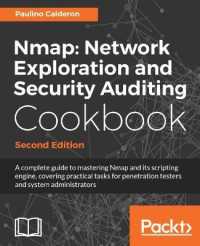Full Description
English Medium Instruction (EMI) is a burgeoning field of interest for researchers and practitioners; however, to date its sociocultural and political implications have not been widely considered. This book addresses that concern by situating EMI within wider sociopolitical contexts of knowledge and language. It foregrounds the notion of 'Critical EMI,' bringing together applied linguists to revisit EMI in higher education from critical sociocultural perspectives. The notion of criticality is conceptualized as an attempt at addressing issues of ideology, policy, identity, social justice, and the politics of English. The chapters explore Critical EMI concerns in diverse settings across five continents, and present insights for the theory, research, policy, and practice of EMI. The book also problematizes the neocolonial spread and dominance of English through EMI. Calling for an explicit and inclusive EMI praxis, it is essential reading for researchers of applied linguistics and English language education, as well as teacher practitioners.
Contents
Foreword Ruanni Tupas; 1. Critical views of English medium instruction Seyyed-Abdolhamid Mirhosseini and Peter I. De Costa; Part I. Ideologies and Educational Policies: 2. Conceptualizations of English in an Italian EMI context Francesca Helm; 3. Ideologies of language use in an EMI university in Hong Kong: the perspectives of international students Matthew Sung; 4. Burdening EMI with unnecessary baggage: critiquing an EMI case in Japan as an ideologically-laden undertaking Glenn Toh and Mark Zion; 5. Entrepreneurial orientations towards language and education: EMI policy in Kazakhstan Aigerim Kazhigaliyeva, Syed Abdul Manan and Anas Hajar; 6. A critical approach to the rise of EMI: why, how and by whom are decisions made? Dogan Yuksel, Peter Wingrove, Marion Nao, Beatrice Zuaro and Anna Kristina Hultgren; Part II. Identity and Educational Justice: 7. EMI teachers' discourses and the configuration of their identities in two Colombian universities Mario Molina-Naar and Isabel Tejada-Sánchez; 8. 'I just opened my heart': challenges and contradictions in multilingual EMI teacher identity construction D. Philip Montgomery; 9. Perpetuating inequality in higher education EMI in Ethiopia, Poland, and Japan Jim McKinley, Tolera Simie and Agata Mikolajewska; Part III. The Politics of English in Education: 10. Problematizing 'English' in EMI: a view from Malaysia and Brazil Azirah Hashim and Kyria Finardi; 11. A fractured dream of the decolonization and deeliticization of English within EMI programs in South Asia Shaila Sultana; 12. Reproducing the dominance of English through EMI in post-apartheid South Africa Nkonko M. Kamwangamalu; 13. EMI, cognitive capture, and decoloniality Kathleen Heugh; Afterword Graham V. Crookes.




